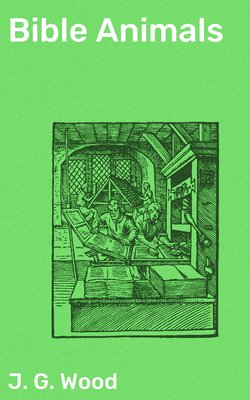Читать книгу Bible Animals - J. G. Wood - Страница 27
На сайте Литреса книга снята с продажи.
THE MOUSE.
ОглавлениеTable of Contents
Conjectures as to the right translation of the Hebrew word Akbar—Signification of the word—The Mice which marred the land—Miracles, and their economy of power—The Field-mouse—Its destructive habits and prolific nature—The insidious nature of its attacks, and its power of escaping observation—The Hamster, and its habits—Its custom of storing up provisions for the winter—Its fertility and unsociable nature—The Jerboa, its activity and destructiveness—Jerboas and Hamsters eaten by Arabs and Syrians—Various species of Dormice and Sand-rats.
That the Mouse mentioned in the Old Testament was some species of rodent animal is tolerably clear, though it is impossible to state any particular species as being signified by the Hebrew word Akbar. The probable derivation of this name is from two words which signify "destruction of corn," and it is therefore evident that allusion is made to some animal which devours the produce of the fields, and which exists in sufficient numbers to make its voracity formidable.
Some commentators on the Old Testament translate the word Akbar as jerboa. Now, although the jerboa is common in Syria, it is not nearly so plentiful as other rodent animals, and would scarcely be selected as the means by which a terrible disaster is made to befall a whole country. The student of Scripture is well aware that, in those exceptional occurrences which are called miracles, a needless development of the wonder-working power is never employed. We are not to suppose, for example, that the clouds of locusts that devoured the harvests of the Egyptians were created for this express purpose, but that their already existing hosts were concentrated upon a limited area, instead of being spread over a large surface. Nor need we fancy that the frogs which rendered their habitations unclean, and contaminated their food, were brought into existence simply to inflict a severe punishment on the fastidious and superstitious Egyptians.
Of course, had such an exercise of creative power been needed, it would have been used, but we can all see that a needless miracle is never worked. He who would not suffer even a crumb of the miraculously multiplied bread to be wasted, is not likely to waste that power by which the miracle was wrought.
If we refer to the early history of the Israelitish nation, as told in 1 Sam. iv.—vi., we shall find that the Israelites made an unwarrantable use of the ark, by taking it into battle, and that it was captured and carried off into the country of the Philistines. Then various signs were sent to warn the captors to send the ark back to its rightful possessors. Dagon, the great fish-god, was prostrated before it, painful diseases attacked them, so that many died, and scarcely any seem to have escaped, while their harvests were ravaged by numbers of "mice that marred the land."
The question is now simple enough. If the ordinary translation is accepted, and the word Akbar rendered as Mouse, would the necessary conditions be fulfilled, i.e. would the creature be destructive, and would it exist in very great numbers? Now we shall find that both these conditions are fulfilled by the common Field-mouse (Arvicola arvalis).
This little creature is, in proportion to its size, one of the most destructive animals in the world. Let its numbers be increased from any cause whatever, and it will most effectually "mar the land." It will devour every cereal that is sown, and kill almost any sapling that is planted. It does not even wait for the corn to spring up, but will burrow beneath the surface, and dig out the seed before it has had time to sprout. In the early part of the year, it will eat the green blade as soon as it springs out of the ground, and is an adept at climbing the stalks of corn, and plundering the ripe ears in the autumn.
When stacked or laid up in barns, the harvest is by no means safe, for the Mice will penetrate into any ordinary barn, and find their way into any carelessly-built stack, from which they can scarcely be ejected. The rat itself is not so dire a foe to the farmer, as the less obtrusive, but equally mischievous Field-mouse. The ferret will drive the rats out of their holes, and if they have taken possession of a wheat-stack they can be ejected by depriving them of access to water. But the burrows of the Field-mouse are so small that a ferret cannot make its way through them, and the nightly dew that falls on the stack affords an ample supply of water.
